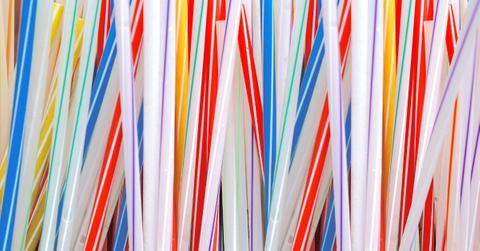Why Disability Activists Are Speaking Out Against Plastic Straw Bans
Plastic straw bans harm people with disabilities — especially since eco-friendly alternatives like metal and paper straws don't work for them.
Updated May 30 2019, 4:16 p.m. ET
In the past year alone, the movement to ban plastic straws has gone from a somewhat fringe concept to a widely accepted policy. Huge corporations, including Starbucks and McDonald's, have announced plans to eliminate plastic straws from their properties, while states like California are considering bills to limit straws in restaurants. But as environmental groups cheer this progress in the fight against single-use plastic, disability advocates say they’re forgetting a major issue.
Some people need straws to survive.
Bendable drinking straws help those with disabilities affecting their joints, muscles, or mobility consume hot and cold liquids, and sometimes meals. That’s why plastic straw bans have sparked a backlash online, particularly in the wake of the Starbucks announcement. Bans on plastic straws would dramatically impact the daily lives of people with disabilities, particularly when they’re not at home.
“I have a neuromuscular disability since birth and it’s progressive so I’m only going to be weaker over time,” Alice Wong, the creator of Disability Visibility Project, explains to Green Matters via email. “This disability affects all of my muscles which impacts my ability to lift and hold things, tilt my head, swallow, and breathe. Plastic straws are great when I’m out and drinking hot liquids. I can bend forward and access a drink without much effort. Plastic straws are effing important in my life, especially while I'm [in] public meeting up with friends and family.”
Wong and other disability advocates argue that anti-plastic straw policies only consider able-bodied customers, virtually erasing others from the discussion. They say it’s a form of ableism, or discrimination against people with disabilities
Part of the problem is a lack of perspective, according to journalist Wendy Lu. Lu frequently covers disability for her job and wears a tracheostomy tube, although she does not rely on plastic straws personally. She recalls getting replies to her social media post on straw bans last month, several from people who were totally unaware of the problems they pose.
“I think that, honestly, people with disabilities are usually forgotten in a lot of different conversations, even in conversations about diversity,” Lu tells Green Matters. “Disability is often an afterthought. You know, we talk about race, gender, sexuality — which are all extremely important aspects to one’s identity — but disability is something that just gets lost. And I think that’s probably a big reason why people didn’t think about it.”
So how can straw bans better accommodate people with disabilities? Many have suggested metal or paper straws as an alternative, but these options still don’t work for everyone. Metal isn’t as pliable as plastic, making it harder to grip or grasp, while paper isn’t as firm and frequently turns into a soggy mess. People with disabilities have also highlighted problems with silicone, bamboo, and compostable straws, indicating more research must be done into an eco-friendly alternative that truly works. In the meantime, disability advocates insist there must be a way to keep plastic straws available for those who need them — perhaps by stocking multiple straw options or offering plastic straws only upon request.
But they also wonder why we aren't focusing on other single-use plastics that could have a bigger environmental effect. Studies show that plastic straws constitute just four percent of the plastic trash in the ocean by piece, and even less by weight, leading many to question why straw bans are so urgent.
“Compared to other things we could be getting rid of, I think there are items that would constitute a much greater amount of plastic,” Lu says. “Things like plastic bags, things like fishing nets. I mean, even just balloons. A lot of disabled activists are saying, we want to save the environment, but why focus on this trend of banning straws that can be really detrimental to thousands and thousands of people for a small positive impact on the environment?”
Above all, disability advocates want a voice in the discussion, and not just on social media after the fact. They want people with disabilities to be included and considered in the decision-making process, so they can help companies and local governments find plastic solutions that harm none and help all.
“I presume corporations do a ton of market research and testing,” Wong says in an email. “The same should go for major changes in policies and practices, not just products and services. It would be smart for them to think about the major segments of society from cradle to grave and how they can serve everyone better. They should also hire disabled people, for obvious reasons.”
Lu adds, “I feel like we’re all on the same side, we’re all trying to make things more accessible and safe and healthy….[instead of] blaming each other for things, we should actually be working together to put the pressure on companies to find alternatives that work for everybody… And I would also like for companies like Starbucks to truly listen to people with disabilities, so that they’re making conscious decisions from the very start.”
